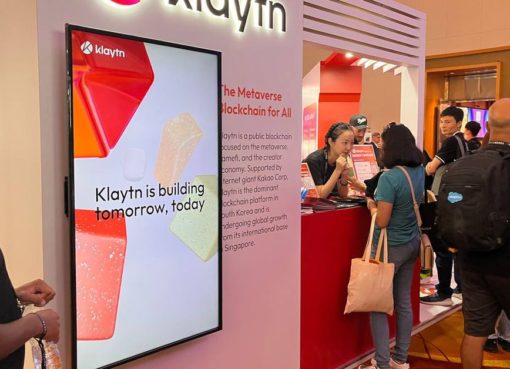Truckers, whose work is essential to the world’s supply chain, are struggling to get compensated due to a lack of fast and seamless payment systems. A blockchain tech start-up claims to have the solution.
Trucks move over 70% of America’s goods producing about US$875.5 billion in gross freight revenues annually according to the American Trucking Associations (ATA), America’s largest national trade association for truckers.
ATA data also show approximately 3.6 million professional truck drivers in the U.S., with independent owner operators accounting for about 800,000 of the figure.
However, despite the industry’s importance, Philip Schlump, the chief commercial officer of TruckCoinSwap – a Wyoming-based fintech and freight company – told Forkast in an interview that the way many truckers are paid is fundamentally flawed and due for a complete overhaul.
“Millions of small trucking companies in the U.S. make up almost all of the shipping spot market, and if these businesses disappeared tomorrow, every grocery store and retailer in North America would be rationing products within a week,” said Schlump.
The trucking spot market, Schlump explains, is where many companies hire freight for an unexpected increase in demand. While many shippers hire truckers on long-term contracts or have their own internal fleets, the spot market allows supply chains to adjust quickly to fluctuating needs.
The spot market is essential for supply chains to meet volatile demand, but according to Schlump, “the payment terms for truckers operating in the spot market are egregious and can take up to months to process.”
Pro-trucker organizations have been raising the issue of long payment terms in the spot trucking market for years. Dale Watkins, a business service manager at OOIDA, a non-profit, American-based trucking advocate, told Forkast that the problem has only gotten worse as more third-party brokers have become involved in freight hiring.
According to Watkins, when a motor carrier receives a job to haul a load, it is safe to assume they will not get paid for at least 30 to 45 days. Thus, a trucker who accepts a job for a long haul could face months of operating costs before they get any compensation.
“In the meantime, they’re out there running fuel, they got insurance, they got truck payments, and they need that money faster,” said Watkins. “And this is where the factoring company comes in for a fee.”
Factoring in the factoring costs
Factoring companies and banks can act as the equivalent of pay-day lenders, buying the truckers’ invoices and giving them access to their pay sooner. However, the arrangement results in truckers essentially selling their invoices at a discount.
Due to a lack of options, truckers are subject to interest rates on their invoices as high as 25% and 35%, according to Watkins. Though it gets truckers paid quicker, they can still be left waiting over a long time to get out of the factoring contract.
“It’s one of those deals that is easy to get into but very hard to get out of,” said Watkins. “One of the first things that a factoring company will do to a motor carrier they sign with is put a lien on their accounts receivables.”
Therefore, no other company can legally pay that motor carrier directly without paying the factoring company. So truckers still may need to wait for the long invoice terms to conclude before they can receive money from another factoring company or a customer.
The payment terms are often laid out in the contract agreed by the trucker, but they have not been getting shorter, and there is no law nor regulation on how soon a broker has to pay a motor carrier, Watkins added.
TruckCoinSwap’s proposed solution
Schlump’s proposed solution to the truck payment problem is a decentralized and blockchain-based marketplace where truckers can sell invoices and turn them into funds within two days.
On TruckCoinSwap’s exchange, which is accessed through a phone app, the collection rights on an unpaid trucker’s invoice are exchanged for its newly created TCS token based on the polygon blockchain. TCS is currently listed on three exchanges and available in 80 countries, according to the company.
The amount of the TCS token that the trucker would receive would equal the expected cash value of the invoice payment. The trucking company could then immediately sell its TCS on one of TruckCoinSwap’s partner exchanges to turn it into US dollars.
“It’s really the same model that the banks and factoring companies are using now with one extra step, and none of the fees,” said Shlump.
While Schlump expects that investors will buy, sell and speculate on TCS, he says truckers will be insulated from token price volatility since the amount of tokens that truckers receive is always adjusted to the cash value of the invoice. The trucker can choose to immediately sell their TCS tokens for U.S. dollars, thus protecting themselves from changes of value.
“Whether the tokens are trading for 10 cents or US$10, it wont really matter to truckers, as long as they are able to trade it all into cash.”
After the purchase of the invoice, TruckCoinSwap then owns the collection rights and waits for the shipper to pay them.
Unlike conventional factoring agreements, Schlump says that TruckCoinSwap does not require liens or collateral from truckers on contracts and will not bind them to the company for more than one job.
While other blockchain companies, such as SyncFab, have advocated for the use of blockchain within supply chains for shipment traceability purposes, TruckCoinSwap appears to be one of the first companies to apply the concept of a blockchain marketplace to the issue of trucker invoicing, said Schlump.
Success of TruckCoinSwap’s model, according to the company, would not only benefit truckers, but all consumers.
“Our hope is that this can put some downward pressure on freight rates and make everything a little less expensive for consumers and households,” Schlump said.
“Ultimately, we all pay more at the grocery store with these trade finance costs baked into this supply chain right now, a lot of people just haven’t realized it yet.”
Would truckers accept blockchain-based markets?
TruckCoinSwap’s model is not without risks. It requires that there are enough TCS buyers for truckers to always be able to liquidate their token payments.
“We would have to have people from outside the transportation industry participating and buying the token… what they’re doing with it is their business, they might be speculating, they might be engaging in arbitrage, or holding.”
In case of a lack of buyers, Schlump says that TruckCoinSwap would also act as a buyer of Trucker’s tokens on the other side of the exchange.
However, questions also remain if such a longstanding and traditional industry like trucking is ready to trust nascent technology such as blockchain and crypto.
According to Rachel Premack, editorial director at FreightWaves, a global supply chain market intelligence firm, the trucking industry can be slow to adopt new technologies.
“Five or 10 years ago, trucking was still running on fax machines, phone calls and paper,” said Premack. “A big reason for that is just how decentralized and disaggregated the whole industry is.”
That is why a number of tech companies, such as Convoy, started by two former Amazon execs, and Uber with their trucking arm Uber Freight, have made recent moves into the trucking invoice business, trying to automate the entire process, Premack said.
“However, a lot of these tech companies are finding that the broker space is more challenging to automate than they initially anticipated, and they’re going into the factoring world instead,” she added.
Any increase in transparency, speed, or efficiency that new technology can bring is significant, according to Premack. However, better factoring alternatives still require a fee from truckers and more time and steps between them and pay day.
“Even a few extra days or weeks of waiting to get paid adds more stress, more cash flow issues, and that’s the last thing a lot of truck drivers need right now as fuel prices are sky high and payment rates are quite down compared to a year or two ago.”
Premack adds that the trucking industry’s reliance on the spot market became especially important during Covid-19 when shipping became unpredictable and as American consumers’ increasingly prevalent “just in time” online shopping culture.
With American companies relying on small independent truckers to get them their products as quickly as possible, the way these front-line workers are paid may also be due for an upgrade.




